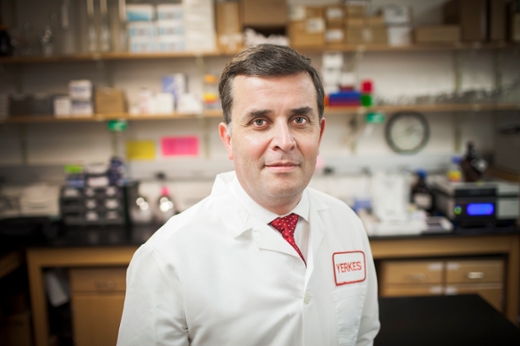Manuel Yepes, MD, has been named the inaugural Rollins Chair in Stroke and Imaging Research at Emory University's Yerkes National Primate Research Center.
Yepes, a physician scientist and board-certified vascular neurologist, has made numerous contributions to understanding how the brain responds to stroke and other injuries, and has a long history of research funding from the National Institutes of Health (NIH) and private foundations. He has published more than 90 scientific articles, book chapters and textbooks, and is the recipient of two patents. Yepes is a tenured professor of neurology at Emory University and director of the Atlanta Veterans Affairs Medical Center Stroke Team.
"We are extremely pleased to have found such a stellar researcher for this first endowed position at the Yerkes National Primate Research Center," says R. Paul Johnson, MD, Yerkes director. "Dr. Yepes' commitment to patients is the force guiding his research. As the first Rollins Chair in Stroke and Imaging Research, he will use the scientific expertise, state-of-the-art imaging facilities and animal colony we have at Yerkes to translate research findings from rodent models to nonhuman primates, a key transition that is likely to lead to the development of novel stroke treatments in humans," Johnson continues.
"Dr. Yepes is an outstanding vascular neurologist and researcher whose career is dedicated to improving treatments for ischemic stroke," says Allan Levey, MD, PhD, chairman of Emory's Neurology Department. Yepes is recognized internationally for research on the molecular mechanisms involved in stroke and the effects of cerebral ischemia on the blood brain barrier. He has been instrumental in helping Emory develop a basic research program in cerebrovascular disease. He received his medical degree from Javeriana University in Bogota, Colombia, and trained at the University of Cincinnati General Hospital as well as Georgetown University.
"As the Rollins Chair in Stroke and Imaging Research, my goal is to create a discovery-oriented research program to develop effective therapeutic tools to protect the brain and promote neurological recovery in people who have had an ischemic stroke," says Yepes. "I look forward to working with my colleagues at Yerkes to develop a research program that brings discoveries made at the bench to the bedside of those who have had a stroke," he continues.
"Our family has great respect for the research taking place at the Yerkes National Primate Research Center and in its leadership," says Amy Kreisler, executive director of The O. Wayne Rollins Foundation. "With Dr. Manuel Yepes' appointment to the Rollins Chair in Stroke and Imaging Research, our hope is the impact of stroke on the American population will be reduced."
"We are honored The O. Wayne Rollins Foundation chose to invest in the Yerkes Research Center by providing the financial support for this endowed chair," says Johnson. "The Rollins family has been integral to the growth of Emory by providing transformational funding for facilities, teaching and research. We look forward to sharing our Rollins-supported research success with the Foundation, the Emory community and all those whose lives we now will have the opportunity to enhance via better stroke treatments," he adds.
About Yerkes National Primate Research Center
Established in 1930, the Yerkes National Primate Research Center paved the way for what has become the National Institutes of Health-funded National Primate Research Center (NPRC) program. For more than eight decades, the Yerkes Research Center has been dedicated to conducting essential basic science and translational research to advance scientific understanding and to improve human health and well-being. Today, the Yerkes Research Center is one of only seven NPRCs. The center provides leadership, training and resources to foster scientific creativity, collaboration and discoveries, and research at the center is grounded in scientific integrity, expert knowledge, respect for colleagues, an open exchange of ideas and compassionate, quality animal care.
In the fields of microbiology and immunology, infectious diseases, pharmacology and drug discovery, transplantation, neurologic and psychiatric diseases, as well as behavioral, cognitive and developmental neuroscience, Yerkes scientists use innovative experimental models and cutting-edge technologies to explore and test transformative concepts aimed at: preventing and treating viral diseases such as AIDS; designing novel vaccines for infectious diseases such as malaria and tuberculosis; enhancing the potential of organ transplantation and regenerative medicine; discovering new drugs and drug classes through high-throughput screening; defining the basic neurobiology and genetics of social behavior and developing new therapies for disorders such as autism and drug addiction; understanding the biology of neurodegenerative diseases such as Alzheimer's and Parkinson's diseases; and advancing knowledge about the evolutionary links between biology and behavior.

